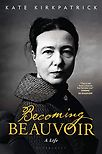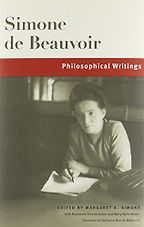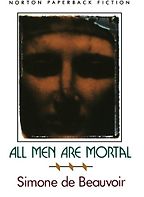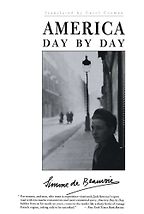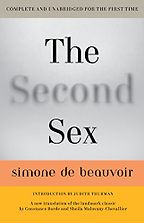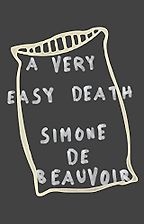Now that you’ve written a biography of her, talked to people who knew her, and immersed yourself in not only her work but also her milieu, could you explain who you think Simone de Beauvoir was?
If I had to summarize her in a single sentence, I would say Simone de Beauvoir is a very misunderstood woman. She was a pioneering feminist. She’s famous for being the mother of second-wave feminism, but she’s also famous because she was the lifelong companion, in some ambiguous sense, of Jean-Paul Sartre. Many of the misunderstandings of her life have, I think, resulted from her own philosophical and political commitments being misconstrued in the way that her life is represented.
You mention she was a ‘second-wave’ feminist: who were the first-wave feminists?
The first wave was in the 19th and 20th centuries, when women were fighting for their rights to property ownership and suffrage. Second-wave feminists tended to focus more on what we might now call the personal aspects of liberation. I said she was the mother of second-wave feminism: one of the reasons I would hesitate to put Beauvoir firmly in the second wave is because in France women only got the right to vote in 1944. So, she was just at the edge of the campaign for suffrage in France.
But she felt women were still excluded from public life and, in particular, that they weren’t taken to have the same originality and capabilities men had. So she was very interested in what happened within women that helped them conceive of themselves as people capable of contributing to public life.
And that was done within the framework of existentialism predominantly, wasn’t it?
It was, yes. The term ‘existentialism’ was coined in the middle of the 1940s by Gabriel Marcel to refer to Sartre’s philosophy. At first, Sartre was reluctant to accept it, but once the label stuck, he ran with it. Unfortunately, this had some negative consequences for Beauvoir philosophically. She was lumped into the same category with Sartre, despite the fact that as early as 1944, she was publishing philosophy that disagreed with his. At that stage, she had already written novels that represented rather different opinions, but were nevertheless called ‘existentialist novels.’
Like Sartre, she was both a novelist and a philosopher. Famously she scored higher marks than he did on a prestigious philosophy exam, in—what was it?
The ‘agrégation.’ It’s a highly competitive national teaching qualification and they only awarded it to the number of applicants for which there were posts in schools. They had already written theses that we might compare to Master’s theses, so this was post-Masters level graduate study. She actually came second in that exam in 1929, but Sartre was taking it for the second time and she was taking it for the first. She was also the youngest person in French history ever to pass it.
So she was an exceptional scholar, as well as a novelist and an original thinker—and also a brilliant speaker, from what I’ve seen on YouTube of interviews with her in later life.
Yes, she was. People often commented on how direct she was. She went straight to the heart of the problem. There are funny stories about this with respect to her disagreements with other philosophers of the period, like Merleau-Ponty. People criticized her for taking such a harsh tone with him in print. She said that she didn’t think it was harsh, and that the best way to explode a bag of hot air was to poke a hole in it.
Sounds like she could have been an analytic philosopher at a modern conference . . . You’ve written this biography of Beauvoir. How many years did it take you to research it?
The first time I presented any research about Simone de Beauvoir was in 2008. But since then I have written my doctorate on Sartre and so it’s very difficult to unpack which years count towards the scholarship that went into this biography. It’s been three years in focused writing, but I’ve been researching the period for much longer than that.
Is there some content in your biography that changes the way we should see Beauvoir now?
Yes. There’s new material. One of the things that’s available in French—that isn’t yet fully available in English—is Beauvoir’s student diaries from the 1920s, which show her philosophical preoccupations prior to meeting Sartre.
So much of her life story has been conflated with the mythical couple Sartre and Beauvoir, but these documents show us how much her philosophical thought was formed prior to meeting him. So there’s the new evidence the diaries represent. There are also new letters from lovers other than Sartre, because his place in her life really wasn’t central in a romantic sense. This is a legend that has lived on too long.
But didn’t they describe their connection as essential and all others around them as contingent? That sounds quite romantic to me! It sounds like John Donne, “They who one another keep Alive, ne’er parted be.”
I suppose this brings us to the philosophical preoccupation that stretches all the way from Beauvoir’s student diaries to her latest works, which is the question: What does it mean to love?
That’s a question that you can approach from a romantic angle, but you can also approach it from an ethical one. Beauvoir was raised in a Catholic household and one of the two greatest commandments of the Christian tradition was that you should love others as yourself. And so Beauvoir, very early on in her life, was asking deep questions about what it meant to love another as herself, because she did not see that commandment lived out in the same way in the lives of men and women.
Five Books interviews are expensive to produce. If you're enjoying this interview, please support us by donating a small amount.
In terms of the essential and contingent relationship, there is something very romantic about the lifelong commitment of Sartre and Beauvoir, but at the age of 21 Beauvoir had already written in her diary that Sartre’s centrality in her life was neither in her heart nor her body “for there many others could be,” but that he was the “incomparable friend of her thought.”
Didn’t she try and throw herself into his grave at the funeral? Or is that an apocryphal story?
I haven’t heard that one, but she did climb onto his hospital bed with his dead body and spend the last night by his side. There was a very deep connection between them, but it was an intellectual connection. One of the things that I find so fascinating about her story is that people find it difficult to believe that a woman and a man could have a deep connection like that on a firmly intellectual basis. It was sexual, but only for about ten years. After that, it was their minds that really brought them together.
Let’s get onto the books you’ve chosen, which are all books by Simone de Beauvoir (rather than about her). With some writers, that would be most of their oeuvre, but for Beauvoir, this is only a small subset of what she wrote. What’s your first recommendation?
Because Beauvoir wrote across several genres, I’ve chosen works that I think are good representatives from the different modes in which she wrote. I’ve chosen to start with Pyrrhus and Cinéas, which is a philosophical essay that was written in 1943 and published in 1944. It’s extremely important not only for understanding Beauvoir’s later works and her philosophical framework, but also because even some of the best secondary literature on Simone de Beauvoir in English says that she was not critical of Sartre. Sometimes people say this about his philosophical thinking and sometimes about his personal behaviour. In both cases, it’s clear that she was critical of him. Pyrrhus and Cinéas gives us the first published record of their disagreement. So in 1943 Sartre published Being and Nothingness, which gives an extremely pessimistic account of human existence. It was also an extremely inspiring one, because of the way it discussed freedom in the context of occupied Paris.
“Pyrrhus and Cinéas gives us the first published record of Beauvoir’s and Sartre’s disagreement”
But Beauvoir thought Sartre had misunderstood freedom. Sartre said that everyone is free and that most people flee their freedom in bad faith—but all they needed to do was look it squarely in the face and then they could make themselves more or less whatever they wanted to be. He did acknowledge some limitations, but Beauvoir didn’t think he acknowledged the limitations that affected certain groups of people enough. So in Pyrrhus and Cinéas, she talks about the concept of freedom and rejects many of the claims Sartre made in Being and Nothingness.
Because this book wasn’t published in English until the last decade, people didn’t know about her role in the development of existentialist philosophy. She does more than reject certain of Sartre’s views: she also puts forward an existentialist ethics. She says explicitly—in a radio interview in 1945—that existentialism does not have an ethics and her aim, in this essay, was to provide it.
Then, a year later, Sartre gave a famous lecture published as “Existentialism is a Humanism” which Simone de Beauvoir edited for publication, and existentialist ethics became more widely associated with Sartre’s name—even though she had played a significant role in the development of the ideas.
I didn’t know she’d edited it. Do you think she’d contributed to it as well?
I don’t know because I haven’t seen the documentary evidence that would provide a conclusion either way. What we do know is that the lecture was given an interrogative title: “Existentialism: Is it a Humanism?” But by the time it was published, it had become an affirmative statement: “Existentialism is a Humanism.” We also know that Sartre was anti-humanist. He was on the record saying that humanism is ‘shit.’ And so it was a conversion on his part to affirm that humanism had value and Beauvoir made a humanist statement in Pyrrhus and Cineas, that it was incoherent to value your own freedom unless you value the freedom of others.
That’s definitely in Existentialism is a Humanism, this idea that existentialism doesn’t just lead to a selfish self-development but that there’s a kind of logical, Kantian sense in which you can’t be free and will your own freedom without willing other people’s freedom.
I don’t think Sartre developed it as clearly in Existentialism is a Humanism as he does later.
There’s an inconsistency in willing your own freedom, but not somebody else’s. It’s trying to answer the objection that anything goes.
Yes, it’s Dostoevsky—if God does not exist, anything is permitted. Beauvoir develops this idea in Pyrrhus and Cinéas. She says that our actions create the conditions for other people’s possibilities in the world. So, to not recognize the role of our own freedom in perpetuating suffering and injustice is ‘bad faith.’ She does use that term, but she also uses the term ‘alibis’ a lot: that people hide from their own responsibility in alibis. It’s already there in this text that she was writing in 1943.
When you say it’s an essay, is it a book-length essay?
In English, it’s published in her book of philosophical writings edited by Margaret Simons. It’s part of this huge scholarly effort to bring Beauvoir’s philosophical work into English. In French, it’s a slim volume of about 120 pages.
What’s your second choice?
My second choice is a novel called All Men are Mortal. One of the things I find fascinating about Simone de Beauvoir is that she has an explicit philosophy of fiction. She said that she published the philosophy that was in Pyrrhus and Cinéas in three different literary forms. There was the philosophical essay, but she also wanted to show it as an imaginary experience in a novel, All Men Are Mortal. She also wrote a play form of the philosophical insight.
Did she do that for everything?
No, she only wrote one play—it wasn’t a form that she decided to keep writing in.
There are many things to like about All Men Are Mortal, but one of the reasons I’m recommending it is that there is no Jean-Paul Sartre character. Many people read Beauvoir’s resistance novels and the novels that are set in 1940s or 1950s Paris and think, ‘This is telling us what it was like to be Jean-Paul Sartre and Simone de Beauvoir and Albert Camus and this stellar cast of French philosophers.’
Get the weekly Five Books newsletter
That’s been very problematic in terms of the reception of Beauvoir’s life, because people have assumed that they can read her fiction as if it’s an accurate representation of real life. Although there are cases where she says explicitly that it is, that doesn’t necessarily mean that the entire novel is autobiographical.
All Men Are Mortal is about a man who makes a deal in the medieval period to become immortal. He thinks that if his life isn’t limited by death, he will be able to right the world’s wrongs, and do away with greed and pestilence and famine. He starts off with this aristocratic life in Italy and lives through huge moments in European history, including the Reformation and the Wars of Religion and the conquest of the New World. He manages to amass tremendous amounts of wealth through this long life, but neither his efforts nor his wealth can cure humanity of its will to destruction.
“Women start to be what Beauvoir calls ‘the eye that sees’ instead of subjects written about by male historians”
It’s this fascinating narrative about an immortal man, Count Fosca, but also about the women who fall in love with him. One of the things that Beauvoir does that is very insightful is that she shows how the situation of women in the different centuries spanning Count Fosca’s life are radically different. In the later centuries, women start to have access to education; they start to fund scientific research and found universities. They start to be what Beauvoir calls ‘the eye that sees’ instead of subjects written about by male historians. Women begin to speak in their own voice as the novel’s narrative goes on.
I’ve also chosen this novel in part because many people think that Beauvoir doesn’t become a political person until the writing of The Second Sex. In fact, her fiction from the 1940s shows that a lot of the preoccupations she had about women’s role in society and the way they’ve been conditioned by history stretch quite a way back into her past.
It sounds like it’s in the tradition of Voltaire’s Candide—not picaresque, but a didactic fable, almost.
Yes. In fact, another genre question that people have about Beauvoir when she started to write autobiography was whether she was trying to use her own life as a bildungsroman for young women. As I said, she did see fiction as providing imaginary experiences, but another phrase that she used to describe the experience of reading was that it could be ‘an authentic spiritual adventure.’ She thought that there was something about reading—when the book is done well—that appeals to the freedom of the reader and helps them reflect on their own possibilities in life.
Is there a particular translation that you’d recommend?
The Euan Cameron translation, which is based on the Friedman one, is a good one.
What’s your third choice?
It’s America Day by Day, which is a travelogue that Beauvoir wrote after she had shot to fame. In 1945 and 1946 she went to America to give a series of lectures on French literature and women writers in France. It was on that trip that she met one of her most famous contingent lovers, Nelson Algren, the American novelist.
But she was shocked by America. Quite soon after arriving, people told her that whatever she did she shouldn’t write about race. And of course she couldn’t obey that imperative because she was too shocked by what she saw.
This is an amazing travelogue. It shows the way she viewed the world when she travelled to other places. It captures that kind of in-betweenness that people feel when they’re not at home, but discovering something that they’ve longed to see for a long time. She loved American fiction and had excellent reading English. It’s this experience of going to a different culture and finding a lot to love about it, but also seeing injustice with all of the clarity of a foreigner’s eyes.
Is it is it a diary of what she did? In some of her memoirs and certainly Sartre’s, he can’t resist philosophizing. He starts off talking about a balloon, and then we’re on to Hegel and Heidegger pretty quickly. Does she do that?
People criticized Beauvoir’s fiction, especially, for being lessons and having too much philosophy. It’s an accusation she frequently faced and in reply she said that she couldn’t stop seeing the world philosophically. She was very much a philosopher who wanted to live her philosophy. That’s part of her disagreement with Sartre—that she didn’t think their concepts of freedom were equally liveable.
So, yes, when she looks at the way people are treated in America she’s thinking about what it means to be reduced to a single aspect of your physically observable characteristics. She stood on the sidewalk with her mixed-race friends, Richard and Ellen Wright, and New York taxis passed her by. On the same day, she would go to parties in her honour with the great and the good of American intellectual life in New York. So she couldn’t stop, she couldn’t turn it off.
You’ve made a brilliant case for the first three books and I’m going to buy all of them. What’s the fourth?
This is the classic—I couldn’t not include The Second Sex, especially because it’s one of the reasons that Beauvoir has been misunderstood in the English-speaking world. Despite the fact that it’s the source of a lot of her fame, the first translation of The Second Sex in 1953 was published by a zoologist by the name of H M Parshley. He cut 15% of the material in the book and much of that was women speaking in their own voices about their experience.
He didn’t have philosophical French; he didn’t understand existentialism. Also, at the time it was published, Blanche Knopf, who made the deal with Parshley to translate it, thought that existentialism was a dead duck. She tried to get him to tone it down because she thought it was a passing fad. So, for well over 50 years, when people read The Second Sex in English, they were only reading 85% of it and they weren’t even reading it with Beauvoir’s philosophical emphases in place.
You’ve already said Beauvoir had excellent reading English. Do you think she didn’t read it?
She did read it and said that it was very upsetting that so much of what was important to her should be omitted. It seems clear that she felt she had little choice in the matter of how it came out.
But fortunately for us, it’s been retranslated.
Yes, it came out in 2009 in the UK and 2010 in the US. What Beauvoir did in The Second Sex—which was originally published in two volumes in 1949—was to set out the facts and myths about what it means to be a woman in the first volume. She looked at what biology, history and literature had to say about what it meant to be a woman and she came to the conclusion that these things really only gave people a definition of what it meant to be a woman from the standpoint of men. Nobody had ever asked to her satisfaction the question of what it means to be a woman to women themselves.
“Beauvoir said, “One is not born, but rather becomes, a woman””
In the second volume, she turns to consider the lived experience of women, and she organized the volume in the stages of a woman’s life. She modified a phrase from a now-forgotten French philosopher, Alfred Fouillée, who said, “One is not born, but rather becomes, free.” He was interested in the philosophical debates between freedom and determinism. He thought that freedom was a special kind of concept, because if you want to be free, your desire to be free can override other desires. For example, if you want to be free from an addiction to cigarettes, that can override the desire for the cigarettes themselves.
Beauvoir said, at the beginning of the second volume, “One is not born, but rather becomes, a woman.” She thought there were significant ways in which women’s education encouraged them not to become themselves—to subordinate themselves to men’s desires. So, she looked at childhood and many experiences common to female bodies to try to understand from women’s own voices how they experience the myths that men had made of them.
Do you mean she literally interviewed people or she found these stories in literature?
In terms of methodology, she did both. She didn’t always say explicitly that that was what she was doing. She quoted a lot from women in their own voices. She needed to do that when talking about experiences like motherhood, which she hadn’t had herself. She combed through written records of women’s experiences, which was very difficult because one of the features of women’s oppression was that they did not have the means or the education to record their experiences in the same quantity or quality that men did.
Five Books interviews are expensive to produce. If you're enjoying this interview, please support us by donating a small amount.
She also drew on her own experience. It’s one of the things that’s been fascinating as a biographer, rereading The Second Sex as she describes experiences that definitely happened to her or close friends and contemporaries without directly attributing them to people. In some cases, they are quite distinctive experiences that make them easily recognizable.
What she was trying to do was to let women give voice to their own dissatisfaction. There’s a metaphor that she frequently uses, that women are too frequently reduced to being seen by men and they self-objectify themselves to try to conform to the desirable ideals that men have of them. She wanted women to be able to become ‘the eye that sees’—that is to say that they see the world and that what they see should shape it.
In Ways of Seeing John Berger had a caricature of this, ‘men act and women appear.’ He was talking about the visual arts, but he’s saying that as a generalization of the way things are—that women tend to be aware of being looked at in a different way than men do.
Yes, and one of the things that’s fascinating about Beauvoir’s analysis is that she wrote it in a period when French philosophers were starting to do the phenomenology of the body for the first time. So, Sartre and Merleau-Ponty in 1943 and 1945 dedicated chapters of philosophy to analyzing the experience of embodiment.
“Coming of age unfortunately means becoming an object”
Beauvoir explicitly criticizes both of them. She says that in the feminine condition, the experience of puberty for women always involves recognizing that you are already objectified. You become what she calls ‘prey’ because there’s so much sexual objectification of women. Coming of age unfortunately means becoming an object.
You’ve described this as the second wave of feminism. There has been a backlash against The Second Sex.
Yes, there are lots of reasons to object to it. It’s definitely of its time in significant respects. The chapter on biology is clearly written in 1949.
Her methodology was inspired, in part, by a Swedish sociologist called Gunnar Myrdal. He had written a book called The American Dilemma, analyzing the situation with respect to race in America in the 1940s. Myrdal said that there was a principle of cumulation which is importantly distinct from a vicious cycle. What happens when you have a principle of cumulation is that people are systematically oppressed. Then they’re judged to be incapable of performing to the same level as the non-oppressed as a matter of nature. So people make nature judgments on the basis of contingent historical situations.
That’s more or less John Stuart Mill’s line in “The Subjection of Women” as well. Don’t judge the hot-housed version of the plant, as it were, that’s not been allowed to flourish under normal conditions.
Yes, it’s similar. He thought this was the dynamic at work in America with respect to race. The hopeful element of this is that the situation can change as people have access to better opportunities. Beauvoir incorporated analogies between race and sex in her analysis in ways that some people now find problematic.
The book has also been called a village study of Parisian intellectual life because she’s generalizing from the experience of women she knew and privileged women writers, who could leave a record of their lives, to speak for womankind. But I don’t think she does that. There are cases where I wish she were more measured in her claims, but it’s a very important part of her argument that the situation of every woman is different. She doesn’t just think the situation of all women in Paris in 1949 is identical.
Get the weekly Five Books newsletter
Of course, your access to money and support and relationships and all the other kinds of resources that humans need to flourish is going to affect your possibilities in the world. But in addition to acknowledging the variation that exists between individual women’s situations, she thought there were some structural problems that needed to be addressed.
So the final book you’ve chosen is A Very Easy Death. What we all want!
This book should have had the title ‘a very gentle death’ because she loved the poem by Dylan Thomas ‘Do not go gentle into that good night.’ I’ve chosen this because it’s representative of Beauvoir’s life writing. People often refer to her having written four volumes of memoirs that were explicitly about her own life. This one (which could be counted a fifth) is about the death of her mother and it was published in 1964.
I think it is a very moving memoir of the death of someone she loved and reflections on mortality. But it also shows some of the things that preoccupied her throughout her life in terms of, ‘What is the right balance of love?’ In a way, she thought that there are two vicious poles of love: egoism, which is totally self-centred, and devotion, which tyrannically makes the other person the object of love.
Tyrannically in the sense that the other person becomes a tyrant?
No, the person who loves tyrannizes the person they claim to love by not respecting their freedom.
Could you just explain that again? Because that’s quite succinct, the way you’ve put it.
A simpler way to put it might be to say that she thought that people often struggled with either excessive self-renunciation or excessive self-centeredness. This was a dynamic that she observed especially with her own mother, who adopted a lot of the Catholic ideals of self-sacrifice in the way that she lived her life.
“She really underestimated herself. She’s remembered as this pioneering feminist, this trailblazer, but she never set out to be that person”
This book shows Beauvoir as someone who is very human, who’s thinking about what it means to love. Her relationship with her mother wasn’t brilliant; she definitely rejected the life that her mother lived. This is her coming to terms, nevertheless, with the end of her mother’s life and the sacrifices she made in it.
Does she describe the actual process of dying, or is it more about her relationship?
It’s more about her relationship and coming to terms with her mother’s death. Beauvoir and her sister decided not to tell their mother the entire truth about what was happening to her. They knew that her diagnosis was fatal and really it was watching her mother diminish before her eyes. It’s a reflection on that, but also on the dwindling of her hopes about their relationship. So it’s sad, but beautiful.
From the process of writing the biography did your view of Simone de Beauvoir change radically or did you just learn about her in more depth?
My view did change quite a lot, because as I read her works chronologically—to try to get a picture of the way she developed and the way she became the person that she did in time—I could see how much she’d been underestimated by her century, and also that there were moments when she really underestimated herself.
She’s remembered as this pioneering feminist, this trailblazer, but she never set out to be that person. She makes this distinction between who she was from within and who she was from without. One of the things that I find very fascinating about her life is how much she suffered because of the way people viewed her from without.
And would you say she was a better philosopher than Sartre, having studied both in depth?
In many respects, I would.
Five Books aims to keep its book recommendations and interviews up to date. If you are the interviewee and would like to update your choice of books (or even just what you say about them) please email us at [email protected]

